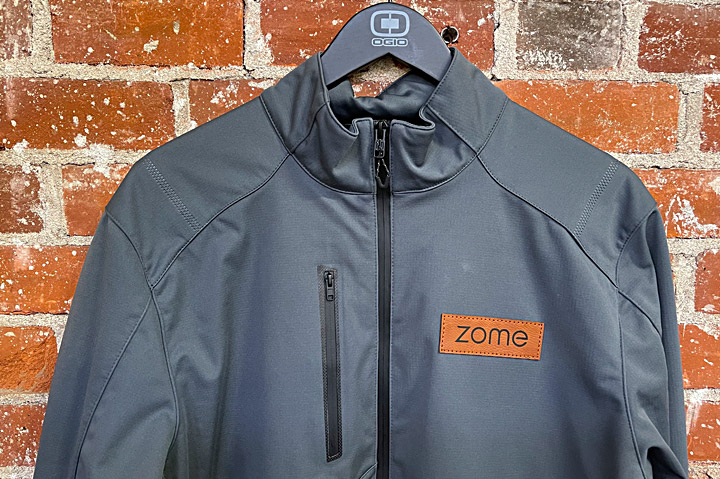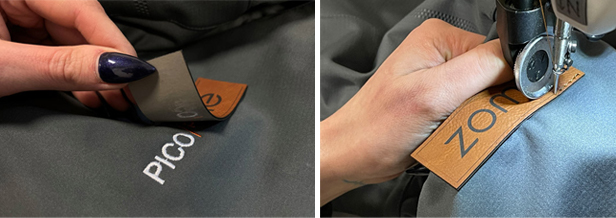Sustainability February 24, 2022
Consider Logoed Patches to Upcycle Apparel Misprints
A Spokane, WA-based decorator explains how leather patches can cover up an embroidered logo, rescuing high-value garments after a costly mistake.
Upcycling – where discarded objects and material are reused in a way that creates a product of higher value than the original – has become a trend in the fashion world, trickling its way into the promo products industry as well. Brands have experimented with screen printing or embroidering new slogans on pre-worn clothing or etching a stenciled logo onto old mason jars. The practice is touted as a more sustainable way to create swag – reducing production of new items and keeping old ones out of landfills.

This self-branded jacket was created by Zome Design to cover up an embroidered logo misprint.
For apparel decorators, there’s another benefit to the practice. A strategically placed patch can cover up an old logo, so that high-value garments like jackets don’t go to waste. It’s a strategy that Spokane, WA-based Zome Design (asi/366115) has employed often. “As an embroiderer, it’s inevitable that you’ll have garment losses during production,” says Brayden Jessen, owner. Setting aside machine-related errors, there are times when an order is completed incorrectly, whether it’s because a sales rep entered the wrong information, the art department made a mistake or the embroiderer pulled the wrong thread color. Rather than scrapping the whole order and starting from scratch, Zome will often work with the client to come up with an alternate solution that reduces waste.
“We’ll go back to the client with the idea of making their logo into some sort of patch and then applying it over the top of the other design,” Jessen says. “This helps save us from having to replace an entire order and can even make the jacket nicer than the client had originally planned on.”

Zome Design covered a logo that had been embroidered in the wrong color with a leather patch, so the jackets wouldn’t have to be discarded.
In a recent example, Zome was working with a client that wanted a very specific color of orange for their embroidery. There was a lot of back-and-forth trying to pinpoint the desired shade, and a miscommunication with the team meant an order of Ogio jackets was embroidered with the wrong color. The mistake was caught before the jackets were shipped out. Zome ordered new jackets, embroidered them with the correct color and shipped them out, without the client even knowing, according to Jessen.
But that still left the decorator with a pile of unusable garments in their shop. Rather than toss them into the trash, Jessen decided to transform the jackets into branded gear for his production team. “Ogio jackets aren’t cheap, and it’d be a shame to just throw away all of these really nice jackets,” Jessen says. “The jackets look even more upscale now that they have leather patches on them, not just basic embroidery.”
Tips for Upcycling With Patches
Here are Brayden Jessen’s tips for upcycling garments with patches.
1. Measure carefully. Zome Design will use lasers to cut patches into a shape that perfectly covers existing embroidery, before sewing the patches onto the garment in question.
2. Consider both sides of a garment. If you’re covering up an embroidered logo, make sure your client is aware that the backing and bobbin thread will still show on the interior. Some garments have an embroidery pocket that zips open and completely conceals backing. In other cases, Zome has been able to put a piece of backing behind the design while sewing to help cover up the back of the old embroidered logo if needed.
3. Be selective. Sometimes clients will bring in garments that have been previously decorated and worn. If every logo is a different shape and size on the used garments, it can be difficult to design a patch that will work across all pieces.
4. Set ground rules. In a similar vein, spell out to clients that any garments for potential logo upcycling must be like new or freshly washed. “Nothing’s worse than getting a bag of old, stinky garments with stains and dirt all over them,” Jessen says. Be wary of using heat transfers as logo coverups on used garments. The head from sending them through a conveyor dryer runs the risk of setting any stains or reactivating smells.

Promo for the Planet is your destination for the latest news, biggest trends and best ideas to help build a more sustainable and socially-responsible industry.
